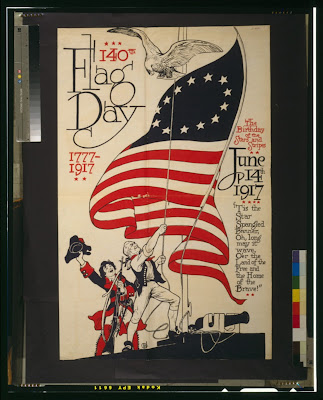A celebration of Continental Congress adoption of the American flag in the First Flag Resolution of June 14, 1777, Flag Day was not officially recognized until President Harry Truman signed it into law in 1949.
Federal law stipulates many aspects of flag etiquette and sections of law dealing with American Flag etiquette. These rules are generally referred to as the Flag Code.
General guidelines from the Flag Code on displaying the flag are:
· The flag should be lighted at all times, either by sunlight or by an appropriate light source.
· The flag should be flown in fair weather, unless the flag is designed for inclement weather use.
· The flag should never be dipped to any person or thing. It is flown upside down only as a distress signal.
· The flag should not be used for any decoration in general. Bunting of blue, white and red stripes is available for these purposes. The blue stripe of the bunting should be on the top.
140th Flag Day
 |  |
| 140th Flag Day | |
Flag Day Public Domain Clip Art
 Flag Day June 14th |  Flag Day as a Flag Day Clip Art |  Flag Day Star Spangled Banner |
 Flag Day Honor America |  Flag Day Old Glory |  Flag Day Celebration |
· The flag should never be used for any advertising purpose. It should not be embroidered, printed or otherwise impressed on such articles as cushions, handkerchiefs, napkins, boxes, or anything intended to be discarded after temporary use. Advertising signs should not be attached to the staff or halyard.
· The flag should not be used as part of a costume or athletic uniform, except that a flag patch may be used on the uniform of military personnel, fireman, policeman and members of patriotic organizations.
· The flag should never have any mark, insignia, letter, word, number, figure or drawing of any kind placed on it, or attached to it.
· The flag should never be used for receiving, holding, carrying or delivering anything.
· When the flag is lowered, no part of it should touch the ground or any other object; it should be received by waiting hands and arms. To store the flag it should be folded neatly and ceremoniously.
· The flag should be cleaned and mended when necessary.
· When a flag is so worn it is no longer fit to serve as a symbol of our country, it should be destroyed by burning in a dignified manner.
· Only the president and governors of the state can order flags on government buildings to be flown at half staff.
· When a flag is no longer serviceable or repairable, it should be destroyed in a dignified manner, such as burning.
· It is acceptable to wash or dry clean an American flag when it is soiled or otherwise dirty.
· People do not have to destroy a flag that has touched the ground. If it becomes dirty, the flag should be cleaned.
· The Flag Code does not prohibit any individual from having the flag draped across a coffin. The deceased does not have to be a veteran to have the flag draped on their coffin.

No comments:
Post a Comment